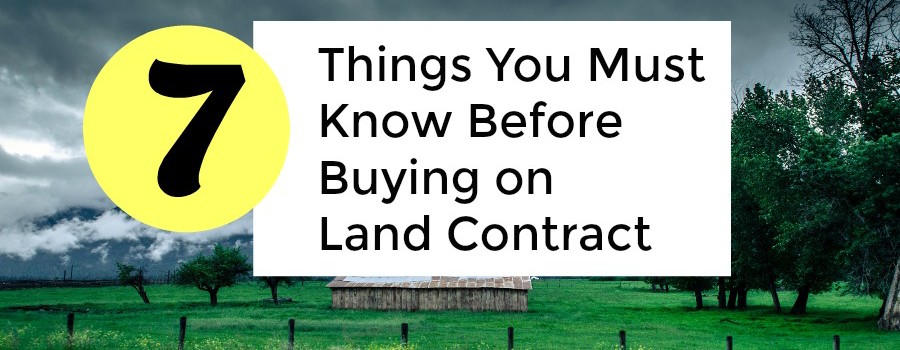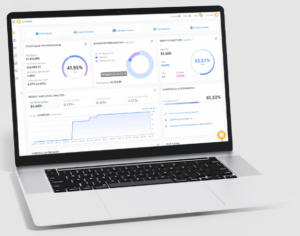Buying a house on land contract (or seller financing) is a great option to go with if you don’t meet normal lending guidelines for traditional financing. It allows you to take ownership of a home without having to deal with banks (temporarily).
Also called “contract for deed” buying a home on land contract has many pros and cons. Below we dive into 7 major things to keep in mind when buying a home on land contract.
By reading this, and considering these factors, you’ll be able to determine if going this direction with your home purchase is the right fit for you and your family.
7 Things You Must Know When Buying a House on Land Contract
Condition of the Property
Many times, a seller is willing to sell on land contract because they know the home is in disrepair. The house may also unique characteristics that won’t pass traditional lending standards.
Selling on land contract is an attractive route because the seller acts as the lender. Since the seller is the “lender” bank guidelines don’t matter at the time.
The issue is that most land contracts have a balloon payment on them. This means there is an expiration date on the contract that says the buyer needs to pay it in full within a certain number of years (usually 5 years or less). At the time when the balloon payment is due, the buyer (you) will need to pay the remaining balance of the land contract. You would do that by either refinancing the home, or selling the home. Now you’re back at square one having to deal with any property condition issues that a lender may see as a problem.
It is in your best interest to get an inspection prior to purchasing the home. You want to know full well what you’re getting yourself into. This way, you can address any property issues as soon as possible, and be ready to refinance.
Paper Trail of Payments 
Since a land contract is usually a temporary solution, it’s extremely important to keep a paper trail of everything. Most importantly, copies of checks of land contract payments.
When it is time to refinance out of the land contract, it is going to be important to show your lender evidence of land contract payments made (on time). Typically, you’ll need to show at least 12 months most recent payments. You might as well keep the paper trail from day one to establish good habits and set yourself up for success for when it’s time to refinance out of the land contract.
Do not make your land contract payments in cash. Make it easy for the payments to be verifiable. The reason it’s so important to show verifiable payment history is because a seller financed loan is not reported on your credit report. This makes being able to show evidence of on time land contract payments crucial.
Terms of Contract
Buying a home on land contract allows for a certain amount of flexibility on terms, rate, and length of contract.
Anything is negotiable. But really, the seller is mostly in control because they are acting as the lender. Typical terms on a land contract are 15-30 year amortization with a 5 year balloon. This means the payment made every month is applied toward principal and interest. At the beginning, a large portion of the payment is applied toward interest, and very little goes toward the principal. As the months go by, more goes toward principal, and less toward interest. This is the best part of buying on land contract (instead of renting). Just like a traditional mortgage, you build equity in the home as the months/years go buy.
Not only do you accumulate equity naturally through market appreciation, but you also build equity by paying the balance down slightly every month. See how it works, download amortization schedule. Interest rates on land contracts vary, but are typically higher than traditional mortgage rates.
Fair Market Value 
When not having to deal with traditional lending guidelines, part of that means you don’t have to deal with low appraisal issues when buying a home on land contract.
This is both a good and bad thing. Good, because you can still proceed with owning the home (even if it’s not worth what the land contract is calling the purchase price). Bad, because if the appraisal comes in low you’re essentially buying a home with negative equity. That puts you into a position where you’re hoping the value goes up in the near future.
On a lighter note, it might not be such a bad thing because homes sold on land contract are often in disrepair, so a low appraisal may be expected (knowing that you’re going to make the updates needed in order to help increase the value).
Keep in mind, just because you spend $20K on a new kitchen, that doesn’t mean the value of the home is going to increase by $20K. Every market is different. The amount you spend on updates doesn’t necessarily equate to amount of increase in home value. Fair market value is based on sold prices of similar homes in the area that have similar amenities and condition.
Down Payment Expectations
It is not uncommon for a seller to expect 10-30% down payment when buying a house on land contract.
It’s extremely rare to see a land contract where the buyer put 5% down or less, but it does happen. Keep in mind that the seller is usually looking to sell the home in order to get proceeds of the sale to purchase a new home or to relocate. If there are very little down payment funds the seller won’t be able to accomplish their goals in many cases.
The idea of a land contract is to provide a win/win solution for a unique scenario. The buyer gets to own a home (even if they have unique income/credit circumstances). The seller gets to sell their home even if there are some unique property circumstances. But if selling means they don’t get any funds up front, it may be a challenge to come to terms with the seller.
When to Refinance 
Refinance out of the land contract as soon as you can.
Rates on land contracts are typically higher than traditional mortgage rates. Why stay in that loan longer than you have to? Make sure there are is not a pre-payment penalty on the land contract. A pre-payment penalty is when you are charged a fee for paying off the loan prior to a certain date. If the land contract has been in place for less than 12 months, the lender is going to treat it as a purchase.
Example: you buy a home on land contract in May, 2016 and seek to refinance out of it in December, 2016. Since you’re in the land contract less than 12 months, the new lender is going to treat the new loan as a purchase loan. The down side to that is you cannot use the new value of the home even if significant improvements have been made. The value will be the lesser of the purchase price or the appraised value. After you have been in the land contract 12 months, you can use the new/appraised value.
Recorded Land Contract vs. Non-Recorded
When it’s time to refinance, it’s very important to understand whether or not the land contract was recorded with the county when you purchased the home.
Typically, you’ll know by looking a recent real estate tax bill. If your name isn’t on the tax bill, that means you’re not the owner (in the eyes of the county), and the land contract wasn’t recorded. Don’t worry, it’s not the end of the world if the land contract wasn’t recorded. Conventional mortgage guidelines state that as long as the land contract was executed for 12 months or more, the new loan can be treated as a refinance.
However, if you’re seeking a government loan like an FHA loan, the land contract needs to be recorded for 12 months in order to treat it as a refinance. If you have been in the loan 12 or more months, and it wasn’t recorded, you won’t be able to “refinance” into an FHA loan, it’ll have to be treated as a purchase. The biggest issue with that is value (having to use the lesser of the purchase price on the land contract or the current fair market value). Simple solution: see if you qualify for conventional financing instead of FHA.
Conclusion
Buying a house on land contract can be a fantastic temporary solution for temporary circumstances. If the intention is to live in the home long term it is crucial to do the appropriate research (above) in order to set yourself up for long-term home ownership success.
By the way, if you do have unique income or credit circumstances you may be a good candidate for a portfolio loan.
 Questions?
Questions?
I invite you to reach out to me directly. With extensive experience in land contract refinancing, I should be able to help you with your land contract financing needs. [testimonials]
Looking forward to connecting with you soon!






 Questions?
Questions?







4 Comments
Leave your reply.